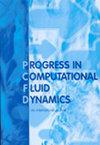Pre- and post-stall characteristics of a very light aircraft's wing for different design parameters
IF 0.5
4区 工程技术
Q4 MECHANICS
引用次数: 0
Abstract
The impact of taper ratio, dihedral angle and wing tip shape on the aerodynamics of a very light aircraft's wing has been investigated by performing URANS simulations at Reynolds number of 5 × 106 for pre- and post-stall conditions. SD 7062 airfoil is selected for the cross-section of the wing geometries investigated. The mean aerodynamic coefficients are found to be invariant to these wing design parameters investigated at low angles of attack. On the other hand, reducing the taper ratio from 1 to 0.5 yields an in-crease in the stall angle of attack and the maximum lift coefficient. The increase of the dihedral angle from 0° to 5° does not lead to any change in the stall angle, however it results a slightly higher maximum lift coefficient with smoother stall behaviour. As evident in the mean surface streamlines, the stall cell formation is observed just above the stall angle for all three wing geometries investigated. The stall cell characteristics with respect to different finite wing design variables and angles of attack are represented and their effects on the sectional lift distributions and total aerodynamic coefficients are discussed.非常轻的飞机机翼在不同设计参数下的失速前后特性
在5 × 106雷诺数条件下,通过URANS模拟,研究了锥比、二面角和翼尖形状对超轻型飞机机翼失速前后空气动力学特性的影响。SD 7062翼型是选择机翼几何截面的调查。在低迎角情况下,平均气动系数对这些机翼设计参数是不变的。另一方面,将锥比从1减小到0.5会增加失速攻角和最大升力系数。二面角从0°到5°的增加不会导致失速角的任何变化,但是它会导致更高的最大升力系数和更平稳的失速行为。从平均表面流线中可以明显看出,在所有三种机翼几何形状的失速角上方都观察到失速单元的形成。描述了不同有限翼设计变量和迎角下的失速单元特性,并讨论了它们对截面升力分布和总气动系数的影响。
本文章由计算机程序翻译,如有差异,请以英文原文为准。
求助全文
约1分钟内获得全文
求助全文
来源期刊
CiteScore
1.50
自引率
14.30%
发文量
33
审稿时长
7.5 months
期刊介绍:
CFD is now considered an indispensable analysis/design tool in an ever-increasing range of industrial applications. Practical flow problems are often so complex that a high level of ingenuity is required. Thus, besides the development work in CFD, innovative CFD applications are also encouraged. PCFD''s ultimate goal is to provide a common platform for model/software developers and users by balanced international/interdisciplinary contributions, disseminating information relating to development/refinement of mathematical and numerical models, software tools and their innovative applications in CFD.
Topics covered include:
-Turbulence-
Two-phase flows-
Heat transfer-
Chemical reactions and combustion-
Acoustics-
Unsteady flows-
Free-surfaces-
Fluid-solid interaction-
Navier-Stokes solution techniques for incompressible and compressible flows-
Discretisation methods and schemes-
Convergence acceleration procedures-
Grid generation and adaptation techniques-
Mesh-free methods-
Distributed computing-
Other relevant topics

 求助内容:
求助内容: 应助结果提醒方式:
应助结果提醒方式:


